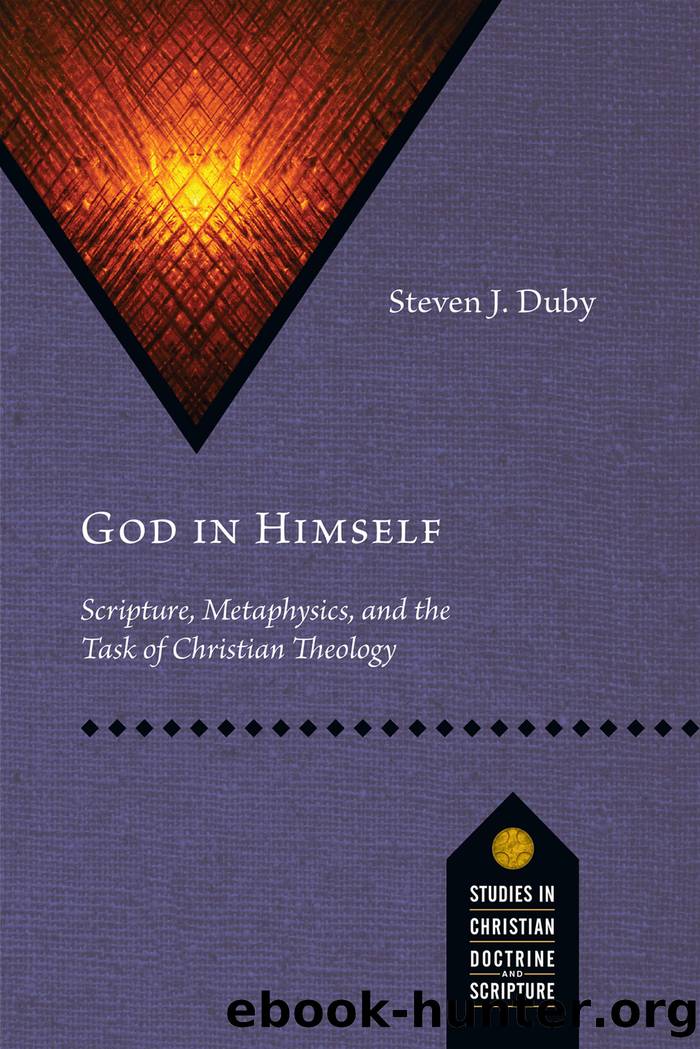God in Himself by Duby Steven J.;

Author:Duby, Steven J.;
Language: eng
Format: epub
Tags: natural theology;revelation;natural revelation;general revelation;special revelation;immanent;doctrine of God;metaphysics;knowledge;knowing;epistemology;Thomas Aquinas;Karl Barth;natural theology;Christian metaphysics;doctrine of god;SCDS;Studies in Christian Doctrine and Scripture;doctrine of analogy;how do we know god;know god;Christian theology
Publisher: InterVarsity Press
Published: 2019-10-17T13:32:00+00:00
âTo Whom Will You Compare Me?â
Retrieving the (Right) Doctrine of Analogy
THE TASK OF OFFERING DESCRIPTION of God in himself necessarily involves using language that human beings customarily apply to themselves and to fellow creatures. This raises the question of how creaturely language can be applied to God without undermining either Godâs transcendence or our genuine knowledge of him in that transcendence. Often in the Christian tradition this question has been answered by appealing to an analogyâa similarity that leaves room for significant dissimilarityâthat exists between the sense in which our language applies to creatures and the sense in which it applies to God. There is also an important question about the ontological basis on which this semantic analogy depends. What about our ontological relationship to God would justify our application of creaturely language to God himself? Is there an analogia entis (analogy of being) between us and God according to which we may use our words to describe him?
In exploring this aspect of the practice of theologia I am interested in retrieving a doctrine of analogy for contemporary description of God, but this requires facing several objections raised by systematic and philosophical theologians. Authors like Karl Barth and Wolfhart Pannenberg present serious challenges to the notion of an analogia entis. Others like William Alston and some expositors of John Duns Scotus have argued that analogy alone is insufficient to secure the truthfulness of our speech about God. In this chapter I will first consider some pertinent biblical teaching on the relationship between God and creatures, exploring Godâs otherness or transcendence, on the one hand, and Godâs communicative activity, on the other. These two realities (divine transcendence and divine communication) require us to navigate between triumphalism and agnosticism in our approach to theological description. This will prompt an exploration of how these issues have been handled in historical treatments of analogy and univocity. After surveying some of the major authors, I will explain why I believe a carefully crafted doctrine of analogy is the way forward. Next I will examine objections found in Barth, Pannenberg, and some proponents of univocity and provide a response to them.
Download
This site does not store any files on its server. We only index and link to content provided by other sites. Please contact the content providers to delete copyright contents if any and email us, we'll remove relevant links or contents immediately.
Signature in the Cell: DNA and the Evidence for Intelligent Design by Stephen C. Meyer(2879)
Real Sex by Lauren F. Winner(2873)
The Holy Spirit by Billy Graham(2782)
The Secret Power of Speaking God's Word by Joyce Meyer(2759)
The Gnostic Gospels by Pagels Elaine(2402)
Jesus by Paul Johnson(2232)
Devil, The by Almond Philip C(2207)
23:27 by H. L. Roberts(2144)
The Nativity by Geza Vermes(2119)
Chosen by God by R. C. Sproul(2058)
All Things New by John Eldredge(2052)
Angels of God: The Bible, the Church and the Heavenly Hosts by Mike Aquilina(1870)
Angels by Billy Graham(1845)
The Return of the Gods by Erich von Daniken(1843)
Knowing God by J.I. Packer(1727)
Jesus of Nazareth by Joseph Ratzinger(1710)
Evidence of the Afterlife by Jeffrey Long(1707)
The Gnostic Gospel of St. Thomas by Tau Malachi(1682)
How To Be Born Again by Billy Graham(1673)
